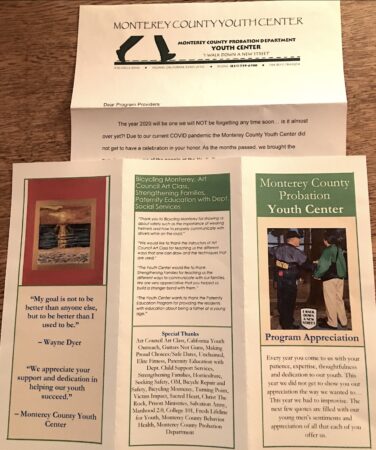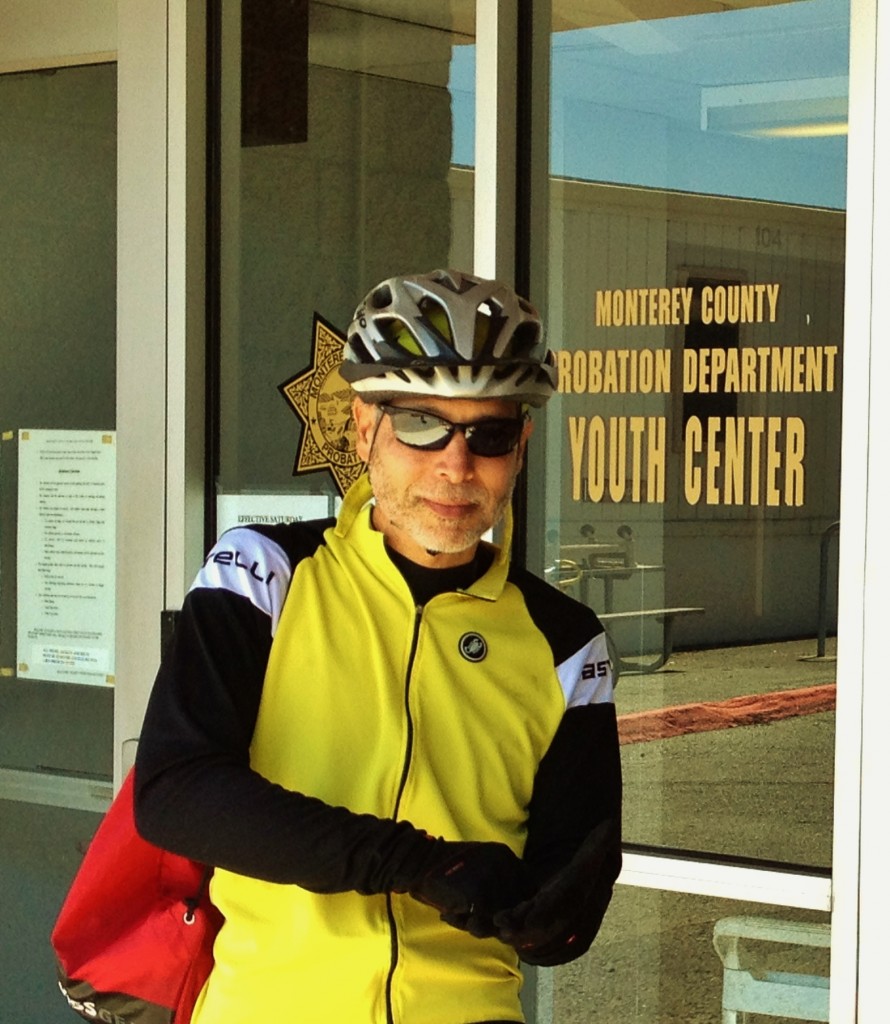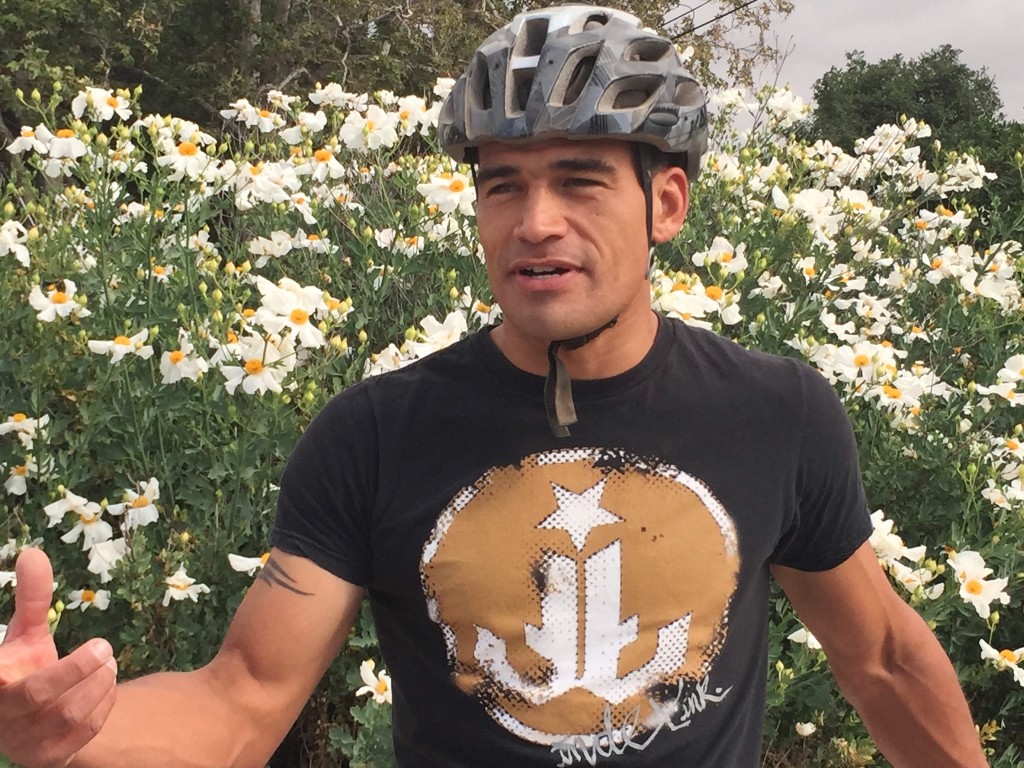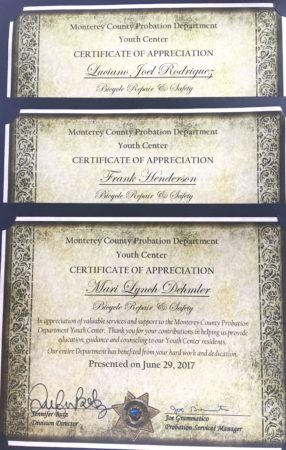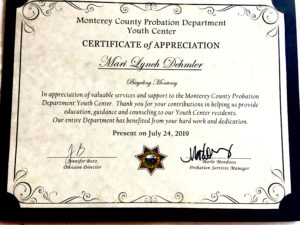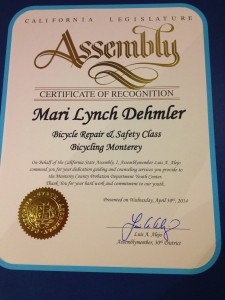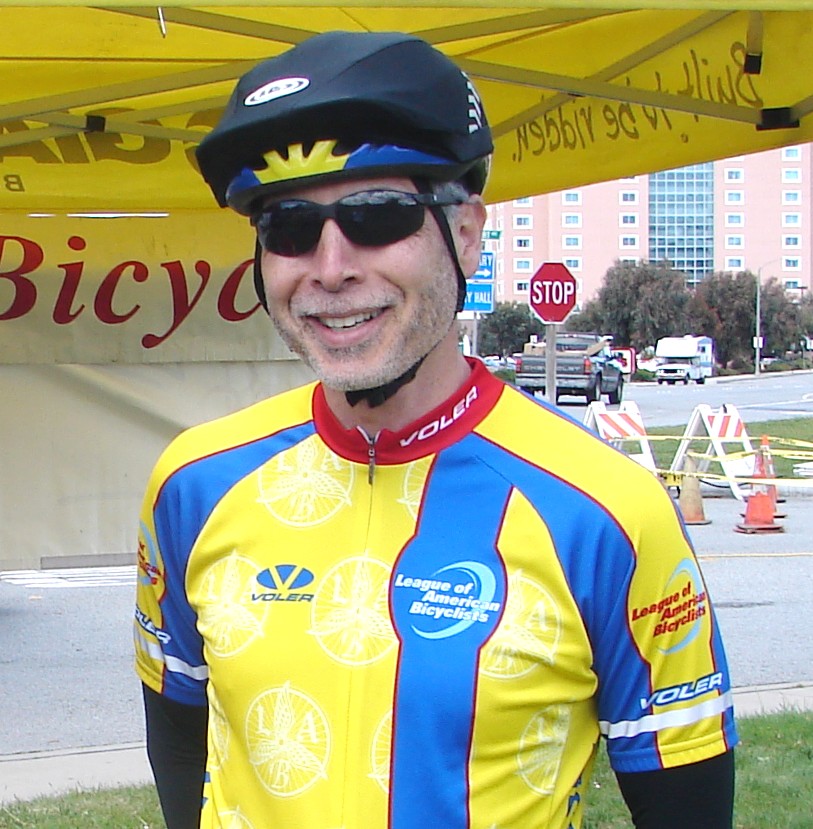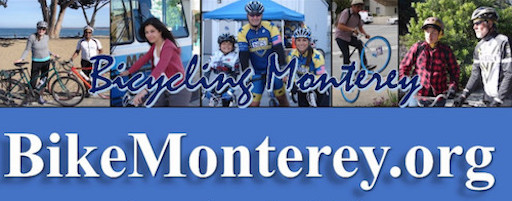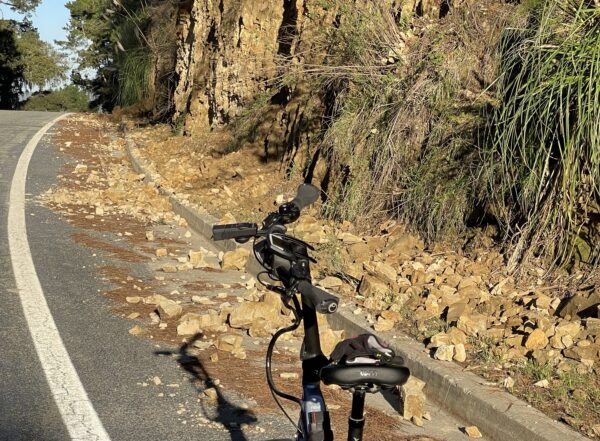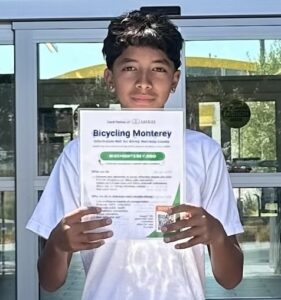Posted by Founder, Bicycling Monterey
Youth Center – first high school bike tech class in Monterey County!
The bicycle education program at the Monterey County Probation Department Youth Center was founded by Bicycling Monterey. The first bike tech class series—providing bicycle repair and maintenance instruction—launched in April 2012 and still rolls on in April 2025!
The longevity of bike tech classes has only been possible because of faithful volunteers. Tip of the helmet to Frank Henderson for volunteering non-stop since the first class in April 2012, and to Luciano Rodriguez for volunteering, most years, since July 2012. Bicycling Monterey is grateful to Frank and Luciano for their consistent dedication over these past 13 years!
A 2025 update:
In 2025 four series of classes are planned, with each series a four-week, two-hour class (eight hours total). The second series for 2025 began on April 26, with the usual four students and two instructors, Frank and Luciano. This 4:2 student-teacher ratio allows plenty of time for the instructors to help students learn when they get stuck on a repair or replacement.
The first class of a series focuses on the tools and bike parts and concludes with the students working together to completely disassemble a bike and then put it back together. In the next three classes, the students expand on and strengthen their budding bicycle repair and maintenance skills.
Typically the first series begins in January, and the last series runs through November, with a month-long break between each series.
NOTE: This is the most up-to-date and comprehensive post about the Youth Center bicycle education program. For a list of related posts since 2012, scroll to the end.
The information below has not been updated. If you have questions about the Youth Center bike program, please contact us.
Below, learn about:
-
The history of the bicycle education program at the Youth Center
-
“I never saw myself doing it”
-
Why volunteer with these teens
-
Volunteer needs—some not requiring bike skills
-
Qualifications for volunteers
-
Veteran volunteers
-
Grad gifts and supplies—more ways to support the class
-
Follow-up for grads
-
Biker’s Ed (aka Bike Nights) for any Youth Center boys (an expansion of the bicycling education program)
-
About juvenile justice
-
Archive – Learn more: links to early posts about the Bicycle Repair and Safety class, acknowledgements of various class supporters over the years, and other historic details.
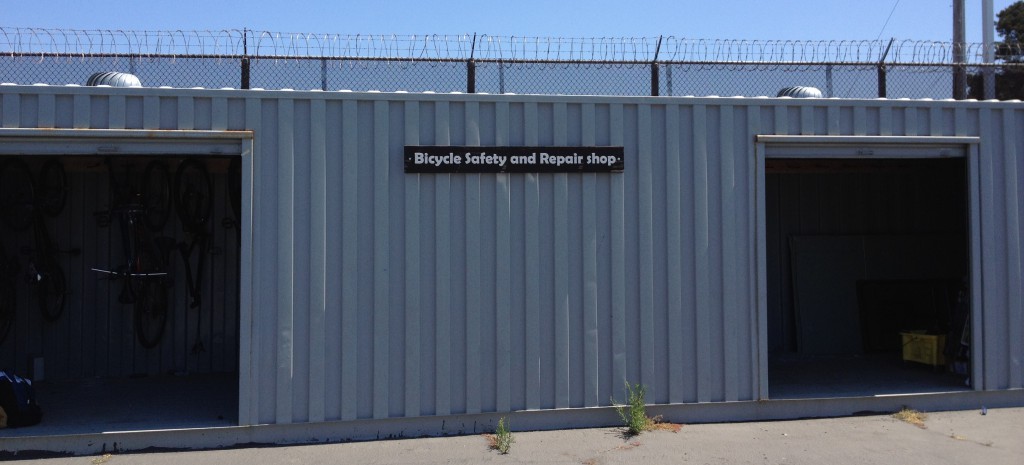
This bicycling advocacy effort is part of
an educational and treatment program for boys at
the Monterey County Probation Department Youth Center.
The boys come from all over Monterey County.
1. History of bicycle education program at the Youth Center, 2011-2025
- For a couple years, Richard Gray, the now retired director of the Monterey County Probation Department Youth Center, had noted the benefits of bike classes at such facilities in other counties. He very much wanted to offer a bike class at the Youth Center, but couldn’t find any volunteers.
- On October 26, 2011, Bicycling Monterey founder Mari Lynch learned that from the director when attending a community meeting. Mari immediately set the wheels in motion, volunteering to establish this instructional program. Other volunteers—repair/maintenance instructors—and additional supporters came aboard (learn about them below). With Mari serving as coordinator, and with the cooperation and support of the Youth Center, the necessary preparations were made.
- On April 15, 2012, instruction began in bicycle repair and maintenance (“bike tech”), with some instruction in riding skills / bike laws / safety too. Regular series of classes were provided through April 27, 2014, plus extra sessions for grads through July 6, 2014.
- Through July 2014, Mari / Bicycling Monterey served as official provider and coordinator of the bike tech class. Establishing and coordinating the class had taken many, many hours—all as a volunteer (bicycle class coordinator fall 2011 – summer 2014). Although she would continue to provide various support, keeping these classes rolling would require a new coordinator and official provider, starting with the fall 2014 school term. Would the class be able to continue? Yes, thanks to the dedication of Luciano Rodriguez.
-
In August 2014, Luciano Rodriguez, a veteran instructor of the bike tech class since July 2012, accepted the additional responsibilities of Bicycle Class Coordinator and official provider. He continued in that role until November 22, 2018.
- In October 2015, to provide an opportunity for boys not eligible for bike tech class (or for whom space wasn’t available in bike tech)—Mari launched occasional Bike Nights aka Biker’s Ed, open to all boys at the Youth Center.
-
On November 22, 2018, Frank Henderson, a veteran instructor of the bike tech class since April 2012, took on the responsibilities of Bicycle Class Coordinator.
- In January 2020, an in-person Biker’s Ed gathering was held. Then the pandemic hit, making it necessary for the Youth Center to temporarily cancel these and other on-site classes. In January 2021, Bicycling Monterey hosted Biker’s Ed online, via Zoom.
- In August 2022, the on-site bicycle repair and maintenance / bike tech classes (which had been on pause since 2020 due to pandemic) were able to resume. Frank Henderson was again at the lead, with Luciano Rodriguez assisting.
- Bike tech classes rolled on in 2023. A change was made for the last two series in 2023, i.e., bike tech class was changed from being an eight-week class to now being a four-week class. This allowed more students a chance to enroll. It also allowed more students to complete the series, since a challenge with eight-week sessions was that sometimes a student was released from the Youth Center before the eight weeks had passed.
- In 2024 all bike tech series were scheduled to be four-week classes. The new series began in January and runs through November, with a month-long break between each series.
- In 2025 all bike tech series were again scheduled to be four-week classes.
- In June 2025 the occasional Biker’s Ed gatherings resume, after being on pause since Feb 2021.
Below: Frank Henderson, bike tech class instructor
Below: Luciano Rodriguez, bike tech class instructor
(Photo courtesy of Richard Lake)
2. “I never saw myself doing it”
Watch a 2-min film clip from Pedal Born Pictures featuring boys not unlike many of those who are students of this class. You’ll hear, “Oh mountain biking, only a certain amount of people get to do that. I never saw myself doing it.”
Youth Center bike education can be part of supporting teens in seeing themselves anew. Their interest may be beach cruising or mountain biking, BMX or road bikes, social rides or bike commuting or racing. Whatever their interest, over the course of a series of classes, they become more aware of the variety of biking opportunities—for transportation, health, recreation, sport, career possibilities, and more. They end up knowing of many biking opportunities that most of the general public is not aware of!
Students in bike tech class also earn a bike by graduation and acquire skills to maintain and repair it themselves. Their skills will allow them to help others too.
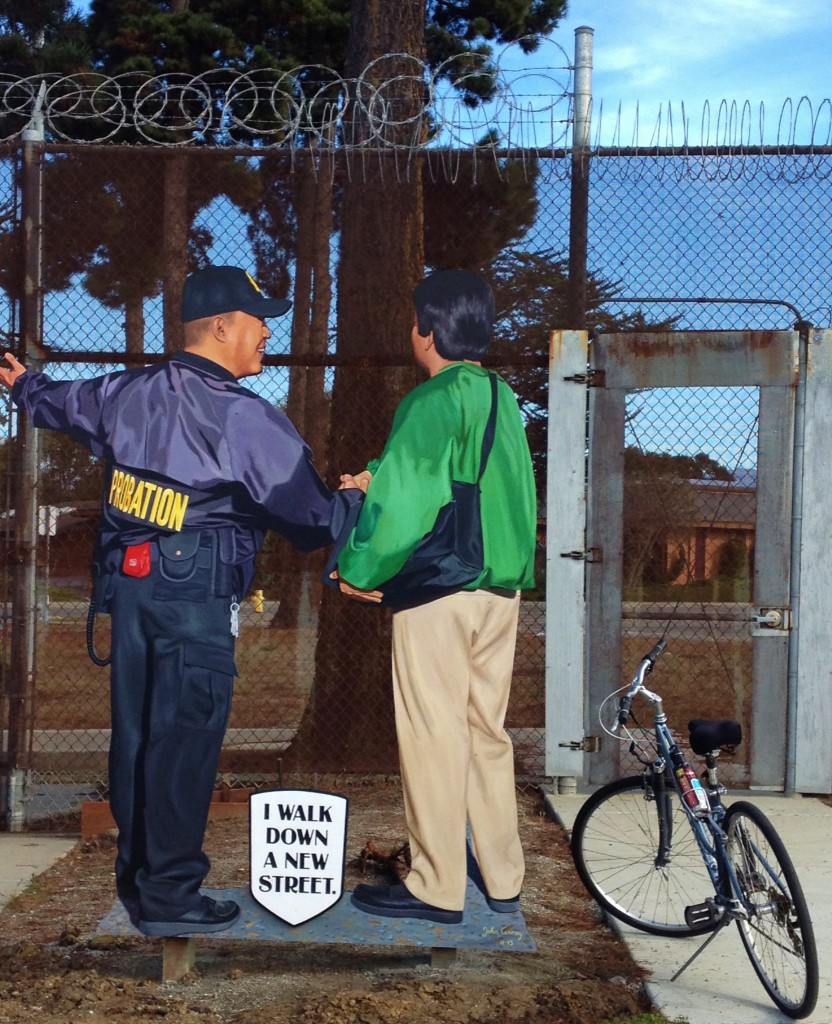 “I bike down a new street too!”
“I bike down a new street too!”
Above: Popular muralist John Cerney added his talent to the Youth Center exit in Autumn 2013 .
3. Why volunteer with these boys?
Boys at the Youth Center are mostly ages 14 to 17, some 18. As reported by Julie Reynolds in a Monterey County Herald story 10/26/11, 80-90% are reported to have learning disabilities. Many have been neglected or abused. Most have been gang involved.
And they are a joy to work with!
The following quotes referred to young men involved in violence on the streets of the Monterey County seat. And it applies to many boys who came to the Youth Center, from all over the county, as well.
“They are making poor choices because they’re poorly supported, and they have come up through a series of social failures that have led them to a life that is close to gangs. That puts them at risk.” Chief of Police, City of Salinas, 8/1/13
Bike tech class teaches repair and maintenance skills, and some bicycle law and safety instruction too. The class also helps the boys become aware of biking resources and opportunities, as it sows seeds to help them become confident of their own place in the bike community!
“The thing about young men is they want to belong. Young men uniquely want to belong to a group, to identify with a group….If [positive] options are not available, they will find another group that will…give them love, acceptance, understanding, support, and value…. [gangs, whose members say,] ‘Nobody else in society wanted you, nobody else in society supports you. But here among us, among other gang members, you will be loved and supported and gain our respect.’”–Chief of Police, City of Salinas, 8/1/13
The bike community has a role to play, as part of a wider community effort, in providing Monterey County boys with far better options.
In addition, as volunteer Frank Henderson puts it, “It is amazing how one bicycle can change a student’s perception, teach them problem solving, and increase their self-confidence. As a teacher for the bike class, I attempt to teach each student how to use the bike class as a tool to be successful in education and life.”
If you’d like to learn more about America’s youth in detention facilities, scroll down to “About juvenile justice.”
4. Volunteer needs—with and without bike tech skills
Assistant(s) to the Bicycle Class Coordinator: Bike tech skills not required
As of December 2023, we are not currently seeking a volunteer to fill this position. (For details about duties of the position, refer to Asst to Youth Center Bike Class Coordinator.)
Bicycle Repair/Maintenance Instructors
At times, more instructors for the bike tech series of classes have been needed—to avoid over-scheduling the current instructors, and toward making it possible to offer the class to a larger number of students. Check with Frank or Mari to learn whether more instructors are currently needed.
- Frank—Phone 831-755-6738, or email: fhenders[AT] hartnell[DOT]edu
- Mari—See contact info.
How often are instructors required to attend? Instructors are asked to be present at the first class, and if possible, at the last class too. In addition, each instructor will typically be teaching once or twice a month, or if a guest instructor, once or twice a series. Where? Youth Center, 970 Circle Drive, Salinas. When? Class dates have been on Saturdays or Sundays, for two hours. Check with Frank Henderson for current specific dates and times.
5. Qualifications for volunteers
- Pass a background check, to be cleared/approved for admittance to the Youth Center. This is a requirement for all volunteers. After Frank Henderson or Mari Lynch have asked that you submit an application to the Youth Center—to receive clearance so you can enter the Youth Center to help us with bicycling-related instruction—here’s the process: Contact Sandra Degnan, Probation Aide, Monterey County Probation Department Youth Center, 970 Circle Drive, Salinas, CA 93905; Phone (831) 759-6738; Email DegnanS@co.monterey.ca.us. Sandra will send you the required forms and any special instructions on how to submit them. The forms can be submitted by postal mail, or scanned and emailed, or even faxed to Sandra’s attention. Be sure to contact Sandra before faxing, including to ensure the privacy of your personal information. Note that a clear copy of your California driver’s license or California ID card, and a covid vaccination card must be submitted as well. (If you are unable to provide a vaccination card, ask Sandra for specific instructions, including whether it’s currently still necessary to provide a new PCR test with negative results each time you’ll enter the Youth Center.) All forms it is necessary to complete were updated in 2022; if you received forms earlier but postponed applying, be sure to ask Sandra for the latest forms.
- Respect all facility rules, e.g., cell phones are forbidden in the Youth Center.
- Strictly adhere to rules about students’ privacy (including but not limited to not taking photographs of the youth, not sharing their names or their cities of past or future residence, and not sharing anecdotes—even without names—about any individual).
- Have a genuine heart for youth.
- Use positive, respectful communication skills.
- Be sensitive to the backgrounds of these youth (e.g., many have experienced neglect, abuse, gang involvement, or been diagnosed as having learning disabilties).
- Be an excellent role model.
- Be committed to fulfilling typical volunteer responsibilities and keeping it fun! This includes standard things, e.g., communications with YC bike education team members, advising promptly of schedule changes, etc.
- Convey respect for bike laws, such as helmets for under 18, seats for bike passengers, brakes on public streets, even if you don’t personally agree with all laws. Here’s a summary: Be Cool, Be Safe – Bike Law Summary & Advocating for Biking. Acknowledging and respectfully discussing varying viewpoints is welcome and helpful to the learning process, of course. Nonetheless, it’s important to help the students know the laws, and vital there is an atmosphere in class of overall encouragement to follow the laws. Not certain you know enough about bike laws yourself? Repair teachers needn’t be experts on bike laws, as others of us can teach bike laws and safety. If you’d like to learn more, refer to Riding Skills, Safety, and CA Bike Laws, or contact us.
- Be supportive of safe riding practices, while also being sensitive to youth interests. For example, students cannot do bike tricks at class, and it could get them in trouble on public streets. However, while advising students of that, instructors may also share where and when bike tricks are appropriate—and what fun that can be.
- And, of course, for volunteers who’ll be teaching repair/maintenance, have a sufficient level of bike repair skills! You don’t need to be licensed or a master mechanic.
For more information about the Youth Center bike tech class, see links at the end of this post.
6. Veteran volunteers with the bike tech class
- Bicycle Repair and Maintenance Instructor Frank Henderson will continue as a volunteer with the bike tech class in 2024. He has been a volunteer with the class since its first session, in April 2012.
- Bicycle Repair and Maintenance Instructor Luciano Rodriguez began as a volunteer with the bike tech class in July 2012 and continued volunteering for the early years of the class. Luciano took a leave of absence on November 22, 2018; in 2022 and 2023 he has been able to provide some assistance to the class and intends to continue in 2024.
Thank you, volunteers.
Honored by the California Assembly and others, Youth Center bike tech class volunteers…
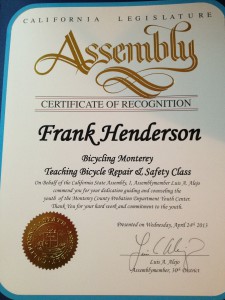
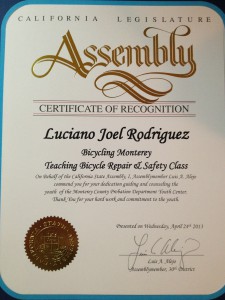
Learn more about Frank Henderson and Luciano Rodriguez, and other YC bike education supporters, here.
Below, Frank Henderson
They must have a lot of free time on their hands.
Quite the contrary! When they took on volunteering at the Youth Center, Frank, Luciano, and Mari were each plenty busy. For their “real jobs,” Frank is Tutorial Services and Supplemental Instruction Coordinator, Tutor Training Instructor, and Exam Proctor at Hartnell College; Luciano is employed at Rancho Cielo and has also been a student at Hartnell College; and Mari is owner of Fine Wordworking, a writing and editing services business. And each one does other volunteering too, beyond Youth Center bike education.
So with busy schedules, why did they find it a high priority to also serve the needs of this class?
Consider what Monterey County Weekly editor Mary Duan suggested in her August 8, 2013 “Local Spin” about violence in our county seat: “Small actions might be the cure….” Among Mary’s ideas was “Exercise your hands” by helping teach bike repair skills at the Monterey County Youth Center.
© 2013 Monterey County Weekly
Other reasons to help? If you are reading this post, chances are you realize there are many and varied benefits to biking! Please support the bicycle interests of these Monterey County youth, so they, too, will likely reap the benefits that biking can bring.
7. Grad gifts and supplies
Supplies and graduation gifts are accepted for students in order to . . .
- support instruction with quality equipment and supplies, so students can develop more effective bike maintenance and repair skills;
- celebrate the students’ graduation from bike tech class, in good standing;
- support the students’ maintaining their own bikes following graduation; and
- help the students identify themselves as members of the bike community!
Who has supported this class by contributing items already? Click here, then look for “Youth Center.”
If you would like to contribute items too—such as new helmets, locks, bike lights, pumps, all-in-one tools, or other tools—please contact Frank or Mari. As of December 15, 2023, donations of bicycles are not currently needed. Please note that red or blue items cannot be accepted. Thank you.
- Frank—Phone 831-755-6738, or email: fhenders[AT] hartnell[DOT]edu
- Mari—See contact info.
8. Follow-up for graduates
When youth graduate from the bike tech class (or have participated in Biker’s Ed), is that where the support ends? Not if they get in touch with Bicycling Monterey, as they’re invited to do.
If Bicycling Monterey knows of a bike-related interest or need they have, we’ll do all we can to support that interest or help meet that need.
9. Biker’s Ed aka Bike Nights: Bicycling education for any Youth Center residents
Biker’s Ed (originally known as Bike Nights) began Oct 30, 2015. It was launched by Mari to offer an introductory bicycling education opportunity to all boys at the Youth Center, even if they weren’t eligible for (or there wasn’t space for them in) the Bicycle Repair and Maintenance aka bike tech class.
These occasional in-person gatherings were offered throughout the year 2015-2019, and on January 31, 2020. Then the pandemic hit, making it necessary for the Youth Center to temporarily cancel these and other on-site classes/gatherings. We experimented with doing these online; in January 2021, Bicycling Monterey hosted a Biker’s Ed meetup via Zoom. Biker’s Ed went on pause in February 2021, and is scheduled to resume in June 2025.
Swag for the boys in Biker’s Ed
Having bike swag can add to the fun of learning about bike laws and safety, the wide variety of bicycling activities and opportunities, and other bike ed topics. They also provide the boys a tangible reminder that people outside care about them and want to encourage them as they prepare for the next chapter of their lives. To learn if contributions of bike swag are currently being collected for the boys, please phone Mari.
What sort of swag is appropriate?
No red or blue items, please. Besides bike-related items that they can use after release from the Youth Center (e.g., bike locks, helmets, pumps, reusable water bottles), the boys often appreciate the following items that they can use immediately: socks; yarn for knitting; comic books; toiletries (must be in clear container); pens and pencils; and jigsaw puzzles. Although any such items are welcome, bet some of you bike-lovers can even find bicycle-themed socks, pens, puzzles, comic books, and such.
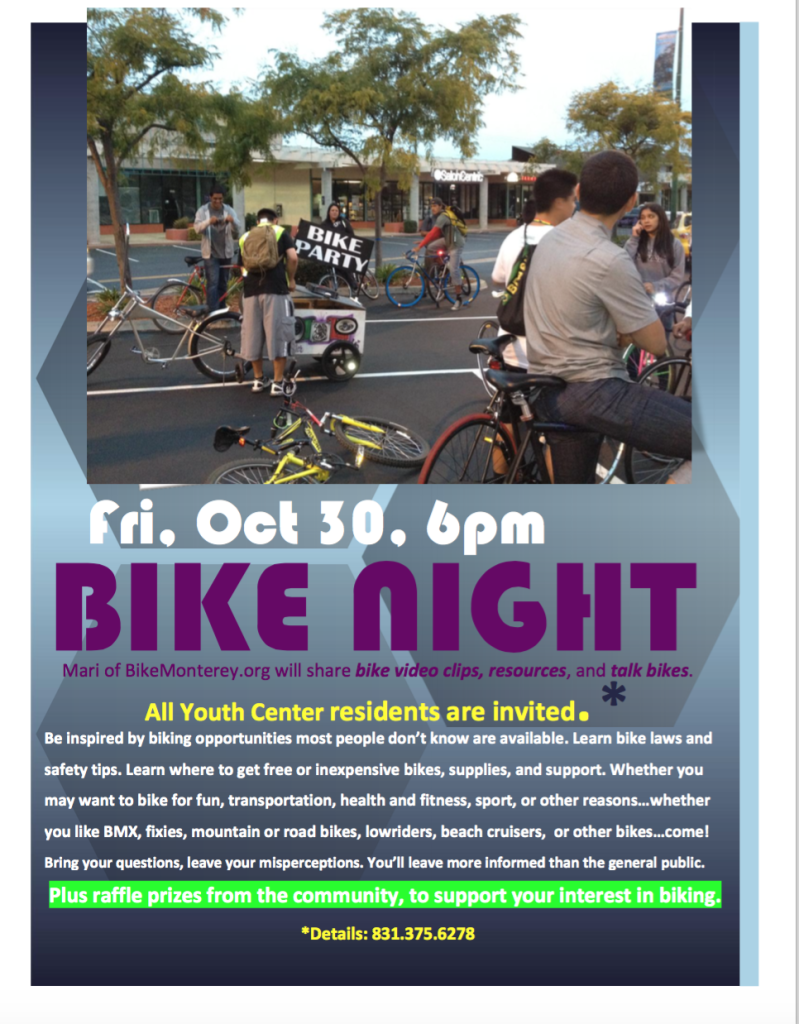
10. About juvenile justice
Did you know…
“Eighty to 90 percent of all American teenagers in confidential interviews will acknowledge that they have committed an offense or offenses that under the law they could be locked up for. [With] most of those kids, nothing happens.”—Nell Bernstein, author of Burning Down the House
Although not specific to the Youth Center, which is a detention center focused on education and treatment, you may be interested in learning more about America’s juvenile prison system. A recommended book is Nell Bernstein’s Burning Down the House.
What Bernstein reported about 80-90% of American teens is relevant for adolescents and those who care about them, everywhere. It’s especially important to keep in mind in neighborhoods and communities where teens are more vulnerable. Consider what this South Bronx, NY gent had to say about the need for mentors for youth; click here.
The majority of youth at the Monterey County Youth Center are Latino, as are the majority of residents of Monterey County.
Click image to enlarge.
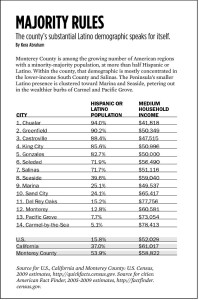 Chart © Monterey County Weekly. Used by permission. Special thanks to Kera Abraham, Kevin Smith, and the Monterey County Weekly for the chart above, previously published in the June 9, 2011 Monterey County Weekly.
Chart © Monterey County Weekly. Used by permission. Special thanks to Kera Abraham, Kevin Smith, and the Monterey County Weekly for the chart above, previously published in the June 9, 2011 Monterey County Weekly.
11. Archive – Learn more about the
history of Youth Center bike education
(Posts are listed in chronological order, from the oldest to most recent)
- Getting on the right path–a bike path! Bicycle Repair and Safety class at Monterey County’s youth treatment center [includes bios for first four instructors and other first-year supporters; gives background about the Youth Center, and earliest history of the class]
- Monterey County Youth Center Bike Tech Class: Be part of the solution in the second year! [includes second-year start-up boosters; and info relevant for students who may be interested in mountain biking and bike teams]
- Thank You, Bike Class Teachers: Monterey County Probation Department Youth Center Honors Providers [includes list of 33 providers supporting the Youth Center’s education and treatment goals]
- Sea Otter Classic Expo 2013 Supporters of Monterey County Youth Center Bike Class [includes list of contributors of project supplies]
- Youth Center – Teach Teens Well [includes qualifications for instructors, and summary to date] – Refer to this post for the most current and comprehensive information.
- Bicycle Class Coordinator Needed for Monterey County Youth [includes a summary about the class, along with job description for the coordinator position]
- Sea Otter Classic Expo 2014 Exhibitors Supporting Monterey County Youth Center Bike Class [includes list of contributors of project supplies]
- Monterey County Youth Center Annual Appreciation Day [includes list of 30 providers supporting the Youth Center’s education and treatment goals]
- For 2019 contributions from some Sea Otter Classic vendors, scroll to 2019 section of contributors of project supplies for all Bicycling Monterey projects.
- April 15, 2019: Bike ed program for incarcerated boys of Monterey County reaches 8th Anniversary [especially honoring sole instructor from April 2012-April 2019]
- Bike Buzz: January 2020 (Bicycling Monterey subscriber news) includes a call for instructional assistants.
Thanks to MacGregor Eddy for providing Californian readers an update about this class via her 5/24/15 “We Could Car Less” column, “The Zen of bicycle repair….”
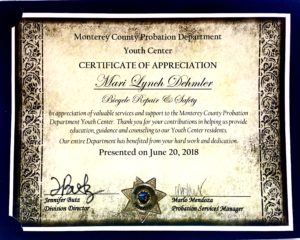
* * * * *
Short link to this post: https://bit.ly/TeachTeensWell
This post was first published July 23, 2013, with extensive subsequent updates through May 23, 2018. Some additional updates were made 2019-2022. On May 5, 2023, the post was updated in its entirety.
This post was published on 29 April 2025. One or more changes last made to this post on 12 May 2025.

